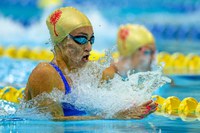Smith, Corbett and Coetzé light up third night of SA Swimming Championships

The former world record holder in the event swam a sensational 2:19.92 in the morning heats and then went even quicker in the final, storming to another national title in a time of 2:19.01.
That places her top in the world so far this year, overtaking American Kate Douglass (2:19.30) and Dutchwoman Tes Schouten (2:19.81) with her evening swim. Coming in second was Smith’s training partner and fellow Olympic finalist Kaylene Corbett, whose morning heat swim of 2:23.84 was already an Olympic qualifying time. She also went quicker in the evening, reaching the finish in 2:23.71 for silver.
“I think I still can’t really grasp the concept... I’m splits away from my PB [the previous world record]… I’m just grateful to be back on the times, feeling myself again in the water,” said an emotional Smith afterwards. “I was really struggling to find my rhythm in the water and I think I’ve gotten it now.”
Speaking about her heat swim, Smith added: “This morning was quite surprising. I really felt comfortable so I was expecting maybe a 2:21 or if I was lucky a 2:20 so when I saw 2:19 it was unreal.
“The finals are obviously a bit tougher because you’re tired after the morning but I think that’s the point of going out hard in the mornings is to challenge yourself and I think if you push yourself over that line then you can expect to do a bit better in the finals as well.
“I’m very grateful. It is a bit of a confidence boost.”
Corbett was pleased to have dipped under the Olympic qualifying time once again but had hoped to go slightly faster.
“I think we’re never satisfied,” she said afterwards. “I would have enjoyed going a little bit faster but it’s all relative, it’s how I feel at the moment and at the end of the day… this is just a stepping stone to Paris so this is where we are right now. You check where you are and then you build from there.”
Also registering another Olympic qualifying time on Wednesday was Pieter Coetzé who claimed the 200m backstroke title in a new personal best time of 1:55.85. The 19-year-old admitted he took it easy in the morning heats to prepare for a big swim in the final.
“I was saving the body a little bit. It’s a long meet so there’s a lot of racing and even though it looked very easy and it was easy this morning, my muscles were still hurting – it’s tough to believe – but I’m glad I did that because I think it paid off,” he said.
“I’m still learning how to pace it [the 200m backstroke]. It’s a tough thing because there are so many ways you can do it. Some people take it out very fast, and just try and hold on. Other people, including myself, normally try and save a little bit for the last 100 or last 50.
“I’ve been trying to try different things and I’ll find what works for me and by the time Paris comes around, I’ll have my strategy mapped out,” he added.
There were mixed emotions for Aimee Canny in the 200m freestyle after achieving a new personal best time of 1:57.39 but just missing out on the Olympic qualifying mark by just .13 of a second.
“It was OK. Obviously I’m a little sad,” she said afterwards. “But I need to stay motivated for the rest of the week. I have the 200 IM on the last day so I’m excited for that.”
Canny may also request to swim a time trial in the event to take another shot at achieving the qualifying time.
“I’ll look at my options… I’ll talk to my coach back in the States and see where I can get that .1,” she explained.
Others to pick up national titles on Wednesday night were Matt Sates in the 200m freestyle (1:48.82), Matthew Randle in the men’s 200m breaststroke (2:14.01) and Hannah Pearse in the women’s 200m backstroke (2:12.19).
Swimming action continues at the Newton Park Swimming Pool in Gqeberha on Thursday morning.
ENDS
Photo credits: SA Sports Images/Anton Geyser
For further information please contact:
Mafata Modutoane
mafata.modutoane@swimsa.org or 073 226 5688.
Swimming South Africa is the governing body of aquatics in South Africa.
Its objective is to encourage the practice of aquatic disciplines for all in South Africa with the purpose of promoting swimming as a life skill through Learn to Swim programmes; providing healthy exercise to South Africans of all ages and races; recruiting recreational swimmers to compete in the various competitions; and promoting competition and athlete development to the highest level. Swimming South Africa is kindly supported by SASCOC, National Lottery Distribution Trust Fund, Arena, Sport & Recreation SA and Rand Water.






